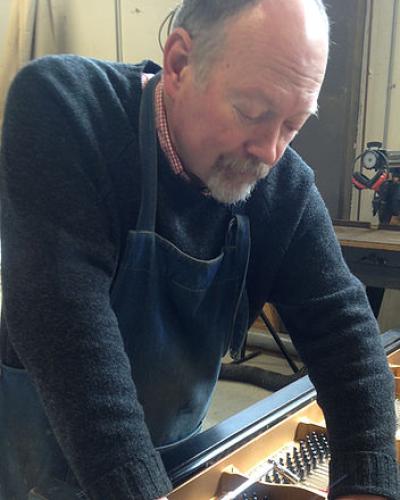Ken Walkup
Piano Technician, Restorer, and Curator
While attending Cornell University in the early 1970s, I began to take an interest in piano tuning and repair. I turned to library books and the journal published by the Piano Technicians Guild, and bought an old upright piano to practice on. At first I was mostly interested in doing it for my own needs, to save money, but I soon realized that it could become a career. I knew that there was a need for it both locally and nationally. In early 1974 I applied to the North Bennett Street School in Boston, then and now the best place in the country to study this subject. For a few months, while waiting for the next class to begin, I took a job at the Aeolian American factory in East Rochester, NY, manufacturer of Mason & Hamlin, Chickering, Knabe, and several other brands of piano.
The director of the piano tech program at NBSS was Bill Garlick. In addition to being an inspiring teacher, he had an important collection of mostly 19th-century pianos, which were housed at the school. So, in addition to a practical education based on modern pianos, I got a terrific introduction to historical pianos as well.
I returned to Ithaca in August 1975. I got work from the start, and around Thanksgiving Day I got a call from Malcolm Bilson, who told me that the job of tuning pianos for the Department of Music was open. He had me tune and regulate a practice room piano; he liked my work, and asked me to take the job, which I was happy to do. The Department was smaller then, with about 35 pianos, and I continued my private piano service business.
Malcolm’s interest in fortepianos grew, and I was of course interested, but in those days I didn’t work on them much. He is perfectly capable of doing his own tuning, and he knows a great deal about the other aspects of piano maintenance. Also, as his concert career took off, he knew he’d have to do most of the tuning for his concerts, because most piano technicians aren’t familiar with fortepianos. But as the decades passed, the term “fortepiano” began to encompass much more than the five octave instruments made in Vienna at the time of Mozart. As the number and variety of his, and Cornell’s, instruments increased, I began doing more of the tuning and other maintenance, especially since about 2000. My own interest and knowledge increased as a result.
I‘m now fortunate to be able to work with the amazing group of pianos at the Cornell Center for Historical Keyboards, covering the entire history of the instrument up to the present. I really enjoy working on the early pianos, and at the same time I am also very much engaged in working on contemporary pianos.

